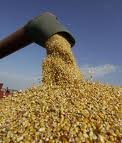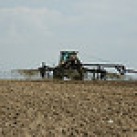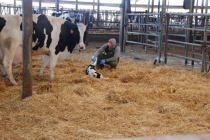General Information
Environment, Tours, Corn, Manure and more..
Environmental Stewardship
Within the Bridgewater Group of Dairies, we strive to excel when it comes to taking care of the environment. Many would say that managing manure and the balance of nature is one of highest priorites of our dairies.
Within the Bridgewater Group of Dairies, we strive to excel when it comes to taking care of the environment. Many would say that managing manure and the balance of nature is one of highest priorites of our dairies.
|
The Ohio Livestock Coalition, and The Ohio Dairy Producers Association have produced several great video's on environmental responsibility, animal care and more. We encourage you to visit their YouTube sites and view the video's some great friends, and individuals from our own dairies are featured here.
The Ohio Dairy Producers YouTube page has a more than 20 video's on animal care, environment, and milk quality topics. The Ohio Livestock Coalition YouTube page focus primarily on environmental practices in all types of Ohio Livestock agriculture. |
|
Tour information

Facility tours of Bridgewater Dairy are hosted on a limited basis, usually for university level educational programs, and agriculture, industry, and technical groups. Conducting tours for the general public is resource intensive and has potential to disrupt the activities and traffic patterns around the dairy as well as expose visitors to risk from equipment operations. Cows, like most animals and humans like to know what to expect on a day to day basis, and tours can tend to create disruptions in their cow and caretaker's routines.
Concerns for public safety, bio-security and the health and welfare of our animals has led Bridgewater Dairy to elect to participate in a larger scale effort to provide a pleasurable and more in-depth educational experience on a state-of-the-art, large scale dairy in Fair Oaks, IN on I-65 about 30 minutes south of Gary.
Concerns for public safety, bio-security and the health and welfare of our animals has led Bridgewater Dairy to elect to participate in a larger scale effort to provide a pleasurable and more in-depth educational experience on a state-of-the-art, large scale dairy in Fair Oaks, IN on I-65 about 30 minutes south of Gary.
|
|
Fair Oaks Farms is home to 30,000 dairy cows milked in multiple 3500 cow facilities similar to Bridgewater Dairy. This group of dairy owners joined together to dedicate one facility to tours and to educate the general public about milk production in the USA. They have the staff and structure to handle any group size on a 7 day a week basis without interupting the activities of the cows.
Fair Oaks is a short three hour drive from our operation. It has an incredible tour program, that includes an amphitheater-style calving barn where you can watch cows give birth. Birthings occur in this amphitheater every 1-3 hours, and adjacent to the barns is a play area for kids of all ages. They also make world famous Cheese's and wonderful tasting Ice Cream which can be purchased in the Fair Oaks Cafe and gift shop. Overall, Fair Oaks Dairy Farms is a great day trip to visit and experience the operations of a modern dairy farm. It also makes a great 'stop-over' visit if traveling in the vicinity - but be sure to allow several hours for your visit. |
Check them out at www.fofarms.com
Read all the above and still feel you want a tour specific to Bridgewater Dairy. Click the following link to fill out an application. Tour requests.
Read all the above and still feel you want a tour specific to Bridgewater Dairy. Click the following link to fill out an application. Tour requests.
Corn Purchasing

Bridgewater Farming grows approximately 2900 acres of corn annually, enough to provide all the corn silage and high moisure corn our cows will consume each year. Each Bridgewater cow will also consume an additional 5 lbs of dry corn grain each day. That is almost 5.5 million pounds or 100,000 bushels of corn Bridgewater Dairy needs to purchase from the local community.
Bridgewater recently expanded their grain storage facility to enable the purchase and storage of this additional grain each fall. Beginning in 2010, Bridgewater began offering opportunities for local corn farmers to sell their corn directly to the dairy and realize an attractive basis and reduced hauling time and costs. A bonus incentive will also be available for growers utilizing manure from Bridgewater's operation. By working together growers and the dairy can increase their profits, and be "greener" by greatly reducing the corn transportation distances from grower to coop and back again to the dairy. Just one more way we hope to do our part for the environement as well as cut some costs for us and our neighbors. Look for our webpage soon that will post details of our corn purchase program.
Bridgewater recently expanded their grain storage facility to enable the purchase and storage of this additional grain each fall. Beginning in 2010, Bridgewater began offering opportunities for local corn farmers to sell their corn directly to the dairy and realize an attractive basis and reduced hauling time and costs. A bonus incentive will also be available for growers utilizing manure from Bridgewater's operation. By working together growers and the dairy can increase their profits, and be "greener" by greatly reducing the corn transportation distances from grower to coop and back again to the dairy. Just one more way we hope to do our part for the environement as well as cut some costs for us and our neighbors. Look for our webpage soon that will post details of our corn purchase program.
Fertilizer (manure application) Sales and Delivery

"There is just something 'special' about cow manure" This is a comment we hear often from farmers who believe cow manure just seems to give a crop that extra kick it needs to do well. Whether an old farmer's tale or document-able science, it is certain that the nitrogen, phosphorus, and potash in cow manure can be a great substitute for commercial N-P-K fertilizer. Now with our methane digester, the manure odor is significantly reduced making it a perfect choice for fields in most locations. We have applied this manure on growing wheat in the spring, on corn and soybean ground before planting, and after alfalfa, wheat, soybean, and corn harvest.
We use most of the manure as fertilizer on our own farm ground, but do also sell it to neighboring farmers. The cost of this application varies depending on the time of year and the manner in which it is applied. It must be applied in accordance with our Ohio Department of Agriculture Livestock Environmental Permit.
Check out our basic rates below.
Liquid Manure - typical application rates will be 8-13,500 gallons/acre (1/3 to 1/2 inch of "rain")
- Delivery before wheat harvest - $1.00 per field
- Delivery after wheat harvest -
$0.002 (2/10 cents) per gallon first 4 miles; $0.003 (3/10 cents) per gallon 5-6 miles; $0.004 (4/10 cents) per gallon 7-9 miles;
$0.001 (1/10 cents) per gallon for use of fraq-tank dragline system.
We use most of the manure as fertilizer on our own farm ground, but do also sell it to neighboring farmers. The cost of this application varies depending on the time of year and the manner in which it is applied. It must be applied in accordance with our Ohio Department of Agriculture Livestock Environmental Permit.
Check out our basic rates below.
Liquid Manure - typical application rates will be 8-13,500 gallons/acre (1/3 to 1/2 inch of "rain")
- Delivery before wheat harvest - $1.00 per field
- Delivery after wheat harvest -
$0.002 (2/10 cents) per gallon first 4 miles; $0.003 (3/10 cents) per gallon 5-6 miles; $0.004 (4/10 cents) per gallon 7-9 miles;
$0.001 (1/10 cents) per gallon for use of fraq-tank dragline system.
Frequently Asked Questions

1. Does Bridgewater Dairy sell bull calves? No, Bridgewater Dairy retains their bull calves and raises them to varying ages based on market conditions. Occasionally, we do donate a calf to a 4H fundraiser, or other Agriculture affiliated group.
2. How are cows kept warm in the winter? Dairy cows originated in cold northern climates, and are healthiest when temperatures are between 15 and 70 degrees Fahrenheit. Bridgewater chose to locate in northern Ohio to accommodate cow's preference for this temperature zone. The further south you go the more effort and cost must be made to alleviate summer heat stress on milk cows. We use heavy canvas curtians that drop down and close the open barn sides to shield the cows from the chilling wind in the freestall barns, but some fresh airflow is always necessary. The digester has an added benefit we didn't expect. We use fresh manure fibers from the digester for bedding the cows. Not only are these solids light and fluffy, they are also usually quite warm, and this helps keep the cows warm when the temperature drops below 15 degrees. Temperatures in the cow barns are below freezing on only the coldest days each winter.
3. The followup: How are cows kept cool in the summer? We have installed 4 rows of fans spaced 20 feet apart in each freestall barn and have also added cooling sprinklers every 10 feet along the feed alley to help keep the cows cool. The parlor is filled with fans and sprinklers to keep the cows cool as they deliver us that wonderful milk we all drink. Our goal is to keep the wind speed just above 5 miles an hour anytime the temperature is above 70 degrees, then we add more water as temperatures increase above 70 degree's. In the summer, the fans dry and cool the digester solids, so the warmth from the bedding isn't as much of a factor.
4. What do you do to ensure and enhance animal welfare? We have implemented many programs and procedures to promote the welfare of our cows. First and foremost we believe that keeping cows comfortable and "happy" is the right thing to do. Bridgewater's animals spend most of the first two years of life on a pasture setting in neighboring states before returning to the milk production facility a few weeks before they are expected to give birth to their first calf. All milking animals are inspected daily for any changes in health and newly identified needs are addressed daily by Bridgewater's veterinary care team. Two veterinarians and eight specially trained animal caretakers provide veterinary health care to the herd. Changes in cow food consumption and milk yield are measured and recorded electronically and used to identify cows with special needs. Pedicures are done twice annually. Each animal handler and caretaker is formally trained in correct animal and management procedures. Training is repeated on a recurring, scheduled basis. Bridgewater Dairy subscribes to the animal care standards detailed in the National Dairy FARM program, developed by National Milk Producers Federation.
5. How does Bridgewater Dairy protect surface and groundwater from contamination by manure applications? Bridgewater Dairy applies nutrients to fields only in the quantities that will be used by each cropping system. Soils and manure are analyzed annually, nutrient budgets for each fields are determined and evaluated each year to ensure compliance. Manure application setbacks from surface waters, drainage areas, etc are established and observed. Manure is incorporated into the soil to prevent run-off and reduce odors. Bridgewater Dairy has gained state recognition for their excellent record of environmental stewardship.
2. How are cows kept warm in the winter? Dairy cows originated in cold northern climates, and are healthiest when temperatures are between 15 and 70 degrees Fahrenheit. Bridgewater chose to locate in northern Ohio to accommodate cow's preference for this temperature zone. The further south you go the more effort and cost must be made to alleviate summer heat stress on milk cows. We use heavy canvas curtians that drop down and close the open barn sides to shield the cows from the chilling wind in the freestall barns, but some fresh airflow is always necessary. The digester has an added benefit we didn't expect. We use fresh manure fibers from the digester for bedding the cows. Not only are these solids light and fluffy, they are also usually quite warm, and this helps keep the cows warm when the temperature drops below 15 degrees. Temperatures in the cow barns are below freezing on only the coldest days each winter.
3. The followup: How are cows kept cool in the summer? We have installed 4 rows of fans spaced 20 feet apart in each freestall barn and have also added cooling sprinklers every 10 feet along the feed alley to help keep the cows cool. The parlor is filled with fans and sprinklers to keep the cows cool as they deliver us that wonderful milk we all drink. Our goal is to keep the wind speed just above 5 miles an hour anytime the temperature is above 70 degrees, then we add more water as temperatures increase above 70 degree's. In the summer, the fans dry and cool the digester solids, so the warmth from the bedding isn't as much of a factor.
4. What do you do to ensure and enhance animal welfare? We have implemented many programs and procedures to promote the welfare of our cows. First and foremost we believe that keeping cows comfortable and "happy" is the right thing to do. Bridgewater's animals spend most of the first two years of life on a pasture setting in neighboring states before returning to the milk production facility a few weeks before they are expected to give birth to their first calf. All milking animals are inspected daily for any changes in health and newly identified needs are addressed daily by Bridgewater's veterinary care team. Two veterinarians and eight specially trained animal caretakers provide veterinary health care to the herd. Changes in cow food consumption and milk yield are measured and recorded electronically and used to identify cows with special needs. Pedicures are done twice annually. Each animal handler and caretaker is formally trained in correct animal and management procedures. Training is repeated on a recurring, scheduled basis. Bridgewater Dairy subscribes to the animal care standards detailed in the National Dairy FARM program, developed by National Milk Producers Federation.
5. How does Bridgewater Dairy protect surface and groundwater from contamination by manure applications? Bridgewater Dairy applies nutrients to fields only in the quantities that will be used by each cropping system. Soils and manure are analyzed annually, nutrient budgets for each fields are determined and evaluated each year to ensure compliance. Manure application setbacks from surface waters, drainage areas, etc are established and observed. Manure is incorporated into the soil to prevent run-off and reduce odors. Bridgewater Dairy has gained state recognition for their excellent record of environmental stewardship.
|
Mailing Address:
14587 County Road 8 50 Montpelier, Oh |